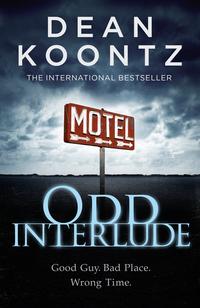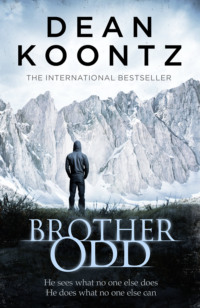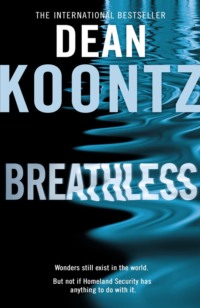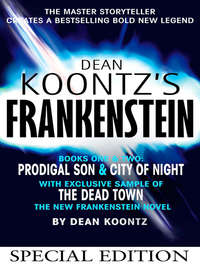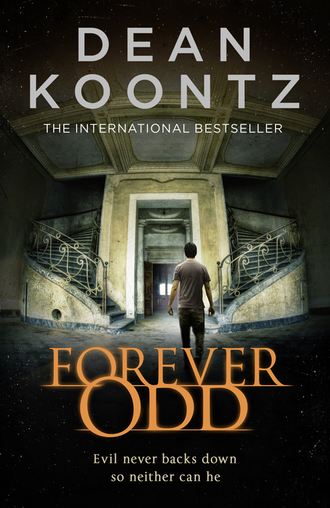
Полная версия
Forever Odd
No one stabbed me when I stepped into the hall once more. I wasn’t expecting anyone to stab me, but that’s when it’s likely to happen.
If Mojave wind still whipped the night, I couldn’t hear it inside this thick-walled Georgian structure, which seemed tomblike in its stillness, in its conditioned chill, with a faint scent of blood on the cool air.
I dared not any longer delay calling Chief Porter. Standing in the upstairs hall, I pressed 2 on my cell-phone keypad and speed-dialed his home.
When he answered on the second ring, he sounded awake.
Alert for the approach of a mad anchorwoman or worse, I spoke softly: “Sir, I’m sorry if I woke you.”
“Wasn’t asleep. I’ve been sitting here with Louis L’Amour.”
“The writer? I thought he was dead, sir.”
“About as dead as Dickens. Tell me you’re just lonesome, son, and not in trouble again.”
“I didn’t ask for trouble, sir. But you better come to Dr. Jessup’s house.”
“I’m hoping it’s a simple burglary.”
“Murder,” I said. “Wilbur Jessup on the floor of his bedroom. It’s a bad one.”
“Where’s Danny?”
“I’m thinking kidnapped.”
“Simon,” he said.
Simon Makepeace—Carol’s first husband, Danny’s father—had been released from prison four months ago, after serving sixteen years for manslaughter.
“Better come with some force,” I said. “And quiet.”
“Someone still there?”
“I get the feeling.”
“You hold back, Odd.”
“You know I can’t.”
“I don’t understand your compulsion.”
“Neither do I, sir.”
I pressed END and pocketed the cell phone.
3
ASSUMING THAT DANNY MUST BE STILL nearby and under duress, and that he was most likely on the ground floor, I headed toward the front stairs. Before I began to descend, I found myself turning and retracing the route that I’d just followed.
I expected that I would return to the two closed doors on the right side of the hall, between the master bedroom and Danny’s room, and that I would discover what lay behind them. As before, however, I wasn’t drawn to them.
On the left side were three other closed doors. None of those had an attraction for me, either.
In addition to the ability to see ghosts, a gift I’d happily trade for piano artistry or a talent for flower arranging, I’ve been given what I call psychic magnetism.
When someone isn’t where I expect to find him, I can go for a walk or ride my bicycle, or cruise in a car, keeping his name or face in my mind, turning randomly from one street to another; and sometimes in minutes, sometimes in an hour, I encounter the one I’m seeking. It’s like setting a pair of those Scottie-dog magnets on a table and watching them slide inexorably toward each other.
The key word is sometimes.
On occasion, my psychic magnetism functions like the finest Cartier watch. At other times, it’s like an egg timer bought at a cheap discount store’s going-out-of-business sale; you set it for poached, and it gives you hard-boiled.
The unreliability of this gift is not proof that God is either cruel or indifferent, though it might be one proof among many that He has a sense of humor.
The fault lies with me. I can’t stay sufficiently relaxed to let the gift work. I get distracted: in this case, by the possibility that Simon Makepeace, in willful disregard of his surname, would throw open a door, leap into the hallway, and bludgeon me to death.
I continued through the lamplight that spilled from Danny’s room, where Demi Moore still looked luminous and the Elephant Man still looked pachydermous. I paused in the gloom at an intersection with a second, shorter hallway.
This was a big house. It had been built in 1910 by an immigrant from Philadelphia, who had made a fortune in either cream cheese or gelignite. I can never remember which.
Gelignite is a high explosive consisting of a gelatinized mass of nitroglycerin with cellulose nitrate added. In the first decade of the previous century, they called it gelatin dynamite, and it was quite the rage in those circles where they took a special interest in blowing up things.
Cream cheese is cream cheese. It’s delicious in a wide variety of dishes, but it rarely explodes.
I would like to have a firmer grasp of local history, but I’ve never been able to devote as much time to the study of it as I have wished. Dead people keep distracting me.
Now I turned left into the secondary hallway, which was black but not pitch. At the end, pale radiance revealed the open door at the head of the back stairs.
The stairwell light itself wasn’t on. The glow rose from below.
In addition to rooms and closets on both sides, which I had no impulse to search, I passed an elevator. This hydraulic-ram lift had been installed prior to Wilbur and Carol’s wedding, before Danny—then a child of seven—had moved into the house.
If you are afflicted with osteogenesis imperfecta, you can occasionally break a bone with remarkably little effort. When six, Danny had fractured his right wrist while snap-dealing a game of Old Maid.
Stairs, therefore, pose an especially grave risk. As a child, at least, if he had fallen down a flight of stairs, he would most likely have died from severe skull fractures.
Although I had no fear of falling, the back stairs spooked me. They were spiral and enclosed, so it wasn’t possible to see more than a few steps ahead.
Intuition told me someone waited down there.
As an alternative to the stairs, the elevator would be too noisy. Alerted, Simon Makepeace would be waiting when I arrived below.
I could not retreat. I was compelled to go down—and quickly—into the back rooms of the lower floor.
Before I quite realized what I was doing, I pushed the elevator-call button. I snatched my finger back as though I’d pricked it on a needle.
The doors did not at once slide open. The elevator was on the lower floor.
As the motor hummed to life, as the hydraulic mechanism sighed, as the cab rose through the shaft with a faint swish, I realized that I had a plan. Good for me.
In truth, the word plan was too grandiose. What I had was more of a trick, a diversion.
The elevator arrived with a bink so loud in the silent house that I twitched, though I had expected that sound. When the doors slid open, I tensed, but no one lunged out at me.
I leaned into the cab and pushed the button to send it back to the ground floor.
Even as the doors rolled shut, I hurried to the staircase and rushed blindly down. The value of the diversion would diminish to zero when the cab arrived below, for then Simon would discover that I wasn’t, after all, on board.
The claustrophobia-inducing stairs led into a mud room off the kitchen. Although a stone-floored mud room might have been essential in Philadelphia, with that city’s dependably rainy springs and its snowy winters, a residence in the sun-seared Mojave needed it no more than it needed a snowshoe rack.
At least it wasn’t a storeroom full of gelignite.
From the mud room, one door led to the garage, another to the backyard. A third served the kitchen.
The house had not originally been designed to have an elevator. The remodel contractor had been forced to situate it, not ideally, in a corner of the large kitchen.
No sooner had I arrived in the mud room, dizzy from negotiating the tight curve of the spiral staircase, than a bink announced the arrival of the cab on the ground floor.
I snatched up a broom, as though I might be able to sweep a murderous psychopath off his feet. At best, surprising him by jamming the bristles into his face might damage his eyes and startle him off balance.
The broom wasn’t as comforting as a flamethrower would have been, but it was better than a mop and certainly more threatening than a feather duster.
Positioning myself by the door to the kitchen, I prepared to take Simon off his feet when he burst into the mud room in search of me. He didn’t burst.
After what seemed to be enough time to paint the gray walls a more cheerful color, but what was in reality maybe fifteen seconds, I glanced at the door to the garage. Then at the door to the backyard.
I wondered if Simon Makepeace had already forced Danny out of the house. They might be in the garage, Simon behind the wheel of Dr. Jessup’s car, Danny bound and helpless in the backseat.
Or maybe they were headed across the yard, toward the gate in the fence. Simon might have a vehicle of his own in the alleyway behind the property.
I felt inclined, instead, to push through the swinging door and step into the kitchen.
Only the under-the-cabinet lights were on, illuminating the countertops around the perimeter of the room. Nevertheless, I could see that I was alone.
Regardless of what I could see, I sensed a presence. Someone could have been crouched, hiding on the farther side of the large center work island.
Fierce with broom, gripping it like a cudgel, I cautiously circled the room. The gleaming mahogany floor pealed soft squeaks off my rubber-soled shoes.
When I had rounded three-quarters of the island, I heard the elevator doors roll open behind me.
I spun around to discover not Simon, but a stranger. He’d been waiting for the elevator, and when I hadn’t been in it, as he had expected, he’d realized that it was a ruse. He’d been quick-witted, hiding in the cab immediately before I entered from the mud room.
He was sinuous and full of coiled power. His green gaze shone bright with terrible knowledge; these were the eyes of one who knew the many ways out of the Garden. His scaly lips formed the curve of a perfect lie: a smile in which malice tried to pass as friendly intent, in which amusement was in fact dripping venom.
Before I could think of a serpent metaphor to describe his nose, the snaky bastard struck. He squeezed the trigger of a Taser, firing two darts that, trailing thin wires, pierced my T-shirt and delivered a disabling shock.
I fell like a high-flying witch suddenly deprived of her magic: hard, and with a useless broom.
4
WHEN YOU TAKE MAYBE FIFTY THOUSAND volts from a Taser, some time has to pass before you feel like dancing.
On the floor, doing a broken-cockroach imitation, twitching violently, robbed of basic motor control, I tried to scream but wheezed instead.
A flash of pain and then a persistent hot pulse traced every nerve pathway in my body with such authority that I could see them in my mind’s eye as clearly as highways on a road map.
I cursed my attacker, but the invective issued as a whimper. I sounded like an anxious gerbil.
He loomed over me, and I expected to be stomped. He was a guy who would enjoy stomping. If he wasn’t wearing hobnail boots, that was only because they were at the cobbler’s shop for the addition of toe spikes.
My arms flopped, my hands spasmed. I couldn’t cover my face.
He spoke, but his words meant nothing, sounded like the sputter and crackle of short-circuiting wires.
When he picked up the broom, I knew from the way he held it that he intended to drive the blunt metal handle into my face repeatedly, until the Elephant Man, compared to me, would look like a GQ model.
He raised that witchy weapon high. Before he slammed it into my face, however, he turned abruptly away, looking toward the front of the house.
Evidently he heard something that changed his priorities, for he threw the broom aside. He split through the mud room and no doubt left the house by the back door.
A persistent buzzing in my ears prevented me from hearing what my assailant had heard, but I assumed that Chief Porter had arrived with deputies. I had told him that Dr. Jessup lay dead in the master bedroom on the second floor; but he would order a by-the-book search of the entire house.
I was anxious not to be found there.
In the Pico Mundo Police Department, only the chief knows about my gifts. If I am ever again the first on the scene of a crime, a lot of deputies will wonder about me more than they do already.
The likelihood was small to nonexistent that any of them would leap to the conclusion that sometimes the dead come to me for justice. Still, I didn’t want to take any chances.
My life is already muy strange and so complex that I keep a grip on sanity only by maintaining a minimalist lifestyle. I don’t travel. I walk almost everywhere. I don’t party. I don’t follow the news or fashion. I have no interest in politics. I don’t plan for the future. My only job has been as a short-order cook, since I left home at sixteen. Recently I took a leave of absence from that position because even the challenge of making sufficiently fluffy pancakes and BLTs with the proper crunch seemed too taxing on top of all my other problems.
If the world knew what I am, what I can see and do, thousands would be at my door tomorrow. The grieving. The remorseful. The suspicious. The hopeful. The faithful. The skeptics.
They would want me to be a medium between them and their lost loved ones, would insist that I play detective in every unsolved murder case. Some would wish to venerate me, and others would seek to prove that I was a fraud.
I don’t know how I could turn away the bereft, the hopeful. In the event that I learned to do so, I’m not sure I’d like the person I would have become.
Yet if I could turn no one away, they would wear me down with their love and their hate. They would grind me on their wheels of need until I had been reduced to dust.
Now, afraid of being found in Dr. Jessup’s house, I flopped, twitched, and scrabbled across the floor. No longer in severe pain, I was not yet fully in control of myself, either.
As if I were Jack in the giant’s kitchen, the knob on the pantry door appeared to be twenty feet above me. With rubbery legs and arms still spastic, I don’t know how I reached it, but I did.
I’ve a long list of things I don’t know how I’ve done, but I’ve done them. In the end, it’s always about perseverance.
Once in the pantry, I pulled the door shut behind me. This close dark space reeked of pungent chemical scents the likes of which I had never before smelled.
The taste of scorched aluminum made me half nauseous. I’d never previously tasted scorched aluminum; so I don’t know how I recognized it, but I felt sure that’s what it was.
Inside my skull, a Frankenstein laboratory of arcing electrical currents snapped and sizzled. Overloaded resistors hummed.
Most likely my senses of smell and taste weren’t reliable. The Taser had temporarily scrambled them.
Detecting a wetness on my chin, I assumed blood. After further consideration, I realized I was drooling.
During a thorough search of the house, the pantry would not be overlooked. I’d only gained a minute or two in which to warn Chief Porter.
Never before had the function of a simple pants pocket proved too complicated for me to understand. You put things in, you take things out.
Now for the longest time, I couldn’t get my hand into my jeans pocket; someone seemed to have sewn it shut. Once I finally got my hand in, I couldn’t get it back out. At last I extracted my hand from the clutching pocket, but discovered that I’d failed to bring my cell phone with it.
Just when the bizarre chemical odors began to resolve into the familiar scents of potatoes and onions, I regained possession of the phone and flipped it open. Still drooling but with pride, I pressed and held 3, speed-dialing the chief’s mobile number.
If he was personally engaged in the search of the house, he most likely wouldn’t stop to answer his cell phone.
“I assume that’s you,” Wyatt Porter said.
“Sir, yes, right here.”
“You sound funny.”
“Don’t feel funny. Feel Tasered.”
“Say what?”
“Say Tasered. Bad guy buzzed me.”
“Where are you?”
“Hiding in the pantry.”
“Not good.”
“It’s better than explaining myself.”
The chief is protective of me. He’s as concerned as I am that I avoid the misery of public exposure.
“This is a terrible scene here,” he said.
“Yes, sir.”
“Terrible. Dr. Jessup was a good man. You just wait there.”
“Sir, Simon might be moving Danny out of town right now.”
“I’ve got both highways blocked.”
There were only two ways out of Pico Mundo—three, if you counted death.
“Sir, what if someone opens the pantry door?”
“Try to look like canned goods.”
He hung up, and I switched off my phone.
I sat there in the dark awhile, trying not to think, but that never works. Danny came into my mind. He might not be dead yet, but wherever he was, he was not anywhere good.
As had been true of his mother, he lived with an affliction that gravely endangered him. Danny had brittle bones; his mother had been pretty.
Simon Makepeace most likely wouldn’t have been obsessed with Carol if she had been ugly or even plain. He wouldn’t have killed a man over her, for sure. Counting Dr. Jessup, two men.
I had been alone in the pantry up to this point. Although the door didn’t open, I suddenly had company.
A hand clasped my shoulder, but that didn’t startle me. I knew my visitor had to be Dr. Jessup, dead and restless.
5
DR. JESSUP HAD BEEN NO DANGER TO ME when he was alive, nor was he a threat now.
Occasionally, a poltergeist—which is a ghost who can energize his anger—is able to do damage, but they’re usually just frustrated, not genuinely malicious. They feel they have unfinished business in this world, and they are people for whom death has not diminished the stubbornness that characterized them in life.
The spirits of thoroughly evil people do not hang around for extended periods of time, wreaking havoc and murdering the living. That’s pure Hollywood.
The spirits of evil people usually leave quickly, as though they have an appointment, upon death, with someone whom they dare not keep waiting.
Dr. Jessup had probably passed through the pantry door as easily as rain through smoke. Even walls were no barrier to him anymore.
When he took his hand off my shoulder, I assumed that he would settle on the floor, cross-legged Indian style, as I was sitting, and evidently he did. He faced me in the dark, which I knew when he reached out and gripped my hands.
If he couldn’t have his life back, he wanted reassurance. He did not have to speak to convey to me what he needed.
“I’ll do my best for Danny,” I said too softly to be heard beyond the pantry.
I did not intend my words to be taken as a guarantee. I haven’t earned that level of confidence from anyone.
“The hard truth is,” I continued, “my best might not be good enough. It hasn’t always been enough before.”
His grip on my hands tightened.
My regard for him was such that I wanted to encourage him to let go of this world and accept the grace that death offered him.
“Sir, everyone knows you were a good husband to Carol. But they might not realize just how very good a father you were to Danny.”
The longer a liberated spirit lingers, the more likely he will get stuck here.
“You were so kind to take on a seven-year-old with such medical problems. And you always made him feel that you were proud of him, proud of how he suffered without complaint, his courage.”
By virtue of the way that he had lived, Dr. Jessup had no reason to fear moving on. Remaining here, on the other hand—a mute observer incapable of affecting events—guaranteed his misery.
“He loves you, Dr. Jessup. He thinks of you as his real father, his only father.”
I was thankful for the absolute darkness and for his ghostly silence. By now I should be somewhat armored against the grief of others and against the piercing regret of those who meet untimely deaths and must leave without good-byes, yet year by year I become more vulnerable to both.
“You know how Danny is,” I continued. “A tough little customer. Always the wisecrack. But I know what he really feels. And surely you know what you meant to Carol. She seemed to shine with love for you.”
For a while I matched his silence. If you push them too hard, they clutch up, even panic.
In that condition, they can no longer see the way from here to there, the bridge, the door, whatever it is.
I gave him time to absorb what I’d said. Then: “You’ve done so much of what you were put here to do, and you did it well, you got it right. That’s all we can expect—the chance to get it right.”
After another mutual silence, he let go of my hands.
Just as I lost touch with Dr. Jessup, the pantry door opened. Kitchen light dissolved the darkness, and Chief Wyatt Porter loomed over me.
He is big, round-shouldered, with a long face. People who can’t read the chief’s true nature in his eyes might think he’s steeped in sadness.
As I got to my feet, I realized that the residual effects of the Taser had not entirely worn off. Phantom electrical sounds sizzled inside my head again.
Dr. Jessup had departed. Maybe he had gone on to the next world. Maybe he had returned to haunting the front yard.
“How do you feel?” the chief asked, stepping back from the pantry.
“Fried.”
“Tasers don’t do real harm.”
“You smell burnt hair?”
“No. Was it Makepeace?”
“Not him,” I said, moving into the kitchen. “Some snaky guy. You find Danny?”
“He’s not here.”
“I didn’t think so.”
“The way’s clear. Go to the alley.”
“I’ll go to the alley,” I said.
“Wait at the tree of death.”
“I’ll wait at the tree of death.”
“Son, are you all right?”
“My tongue itches.”
“You can scratch it while you wait for me.”
“Thank you, sir.”
“Odd?”
“Sir?”
“Go.”
6
THE TREE OF DEATH STANDS ACROSS THE alley and down the block from the Jessup place, in the backyard of the Ying residence.
In the summer and autumn, the thirty-five-foot brugmansia is festooned with pendant yellow trumpet flowers. At times, more than a hundred blooms, perhaps two hundred, each ten to twelve inches long, depend from its branches.
Mr. Ying enjoys lecturing on the deadly nature of the lovely brugmansia. Every part of the tree—roots, wood, bark, leaves, calyxes, flowers—is toxic.
One shred of its foliage will induce bleeding from the nose, bleeding from the ears, bleeding from the eyes, and explosive terminal diarrhea. Within a minute, your teeth will fall out, your tongue will turn black, and your brain will begin to liquefy.
Perhaps that is an exaggeration. When Mr. Ying first told me about the tree, I was a boy of eight, and that is the impression I got from his disquisition on brugmansia poisoning.
Why Mr. Ying—and his wife as well—should take such pride in having planted and grown the tree of death, I do not know.
Ernie and Pooka Ying are Asian Americans, but there’s nothing in the least Fu Manchu about them. They’re too amiable to devote any time whatsoever to evil scientific experiments in a vast secret laboratory carved out of the bedrock deep beneath their house.
Even if they have developed the capability to destroy the world, I for one cannot picture anyone named Pooka pulling the GO lever on a doomsday machine.
The Yings attend Mass at St. Bartholomew’s. He’s a member of the Knights of Columbus. She donates ten hours each week to the church thrift shop.
The Yings go to the movies a lot, and Ernie is notoriously sentimental, weeping during the death scenes, the love scenes, the patriotic scenes. He once even wept when Bruce Willis was unexpectedly shot in the arm.



